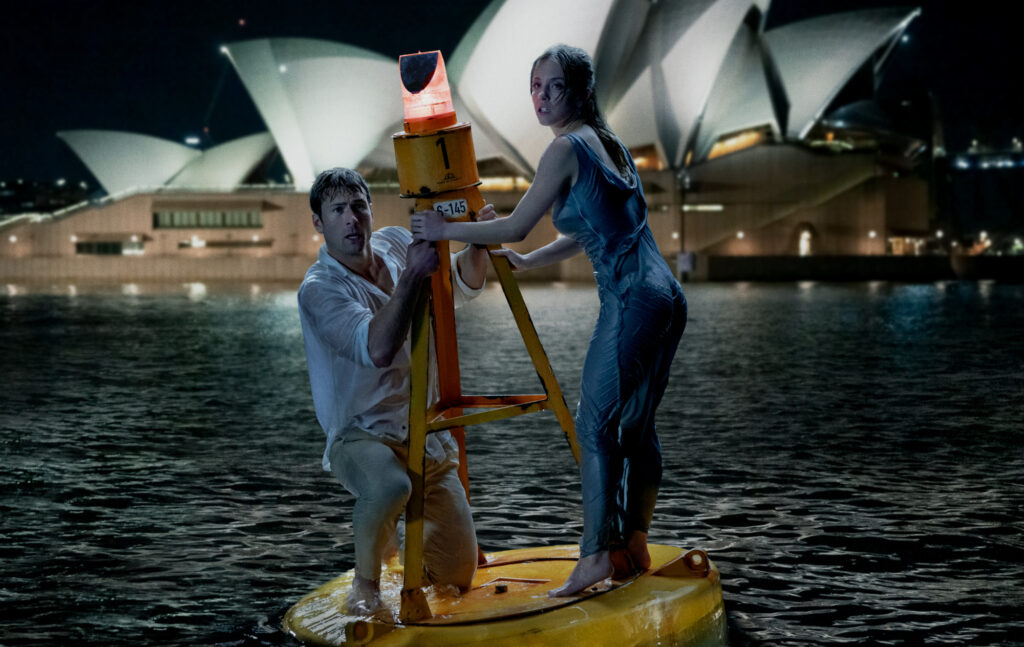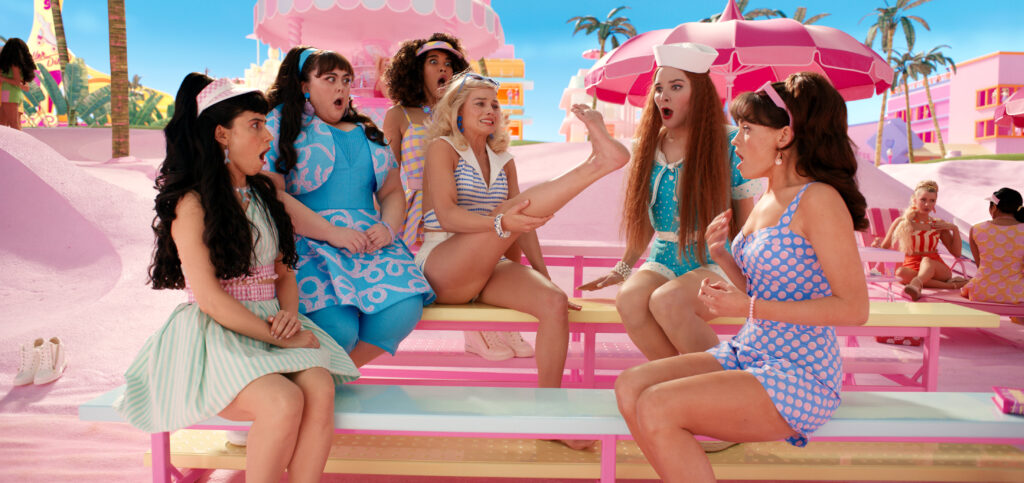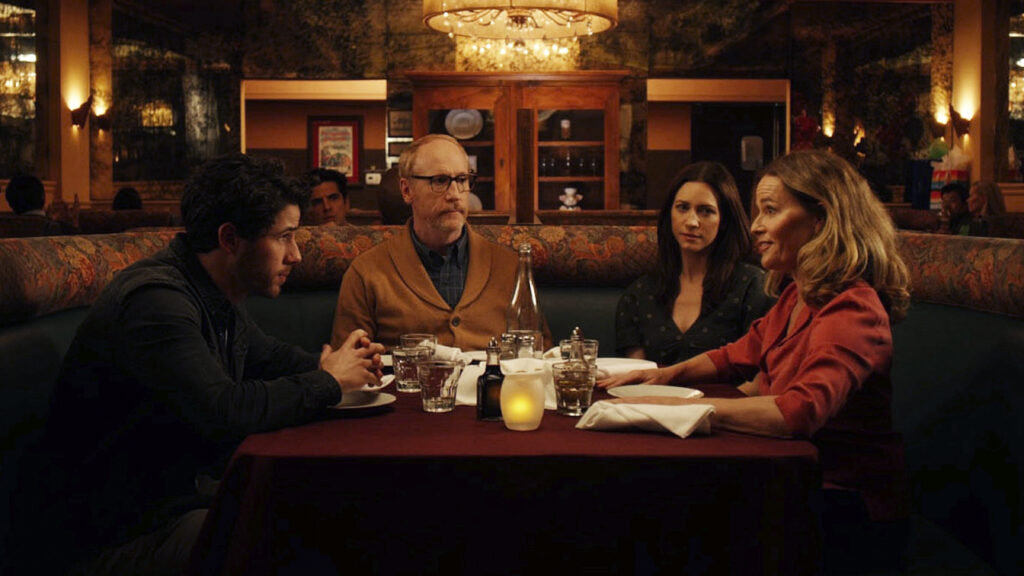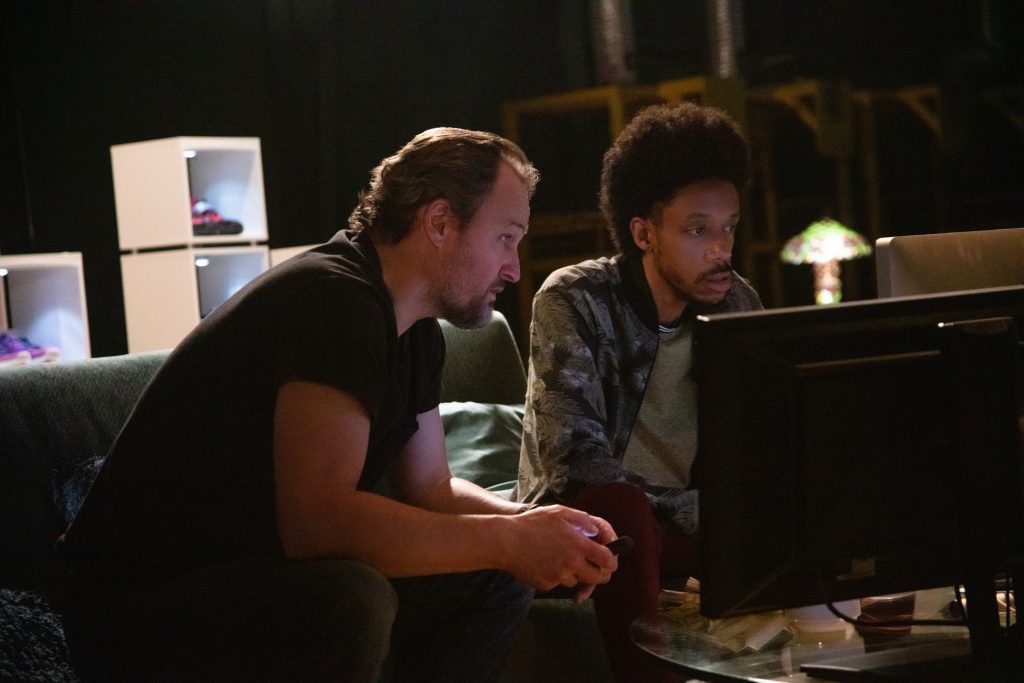December 28, 2023
by Carla Hay

Directed by Will Gluck
Culture Representation: Taking place in an unnamed U.S. city and in Sydney, Australia, the comedy film “Anyone But You” (loosely based on the William Shakespeare play “Much Ado About Nothing”) features a predominantly white cast of characters (with some black people, a few Asians and one indgenous person) representing the working-class and middle-class.
Culture Clash: After have a great first date together, a young would-be couple have angry feelings toward each other because of misunderstandings, but then they pretend to be a couple to make their respective ex-lovers jealous.
Culture Audience: “Anyone But You” will appeal primarily to fans of stars Sydney Sweeney, Glen Powell, and corny and predictable romantic comedies.

When will certain filmmakers learn that pretty people in pretty locations do not automatically equal an enjoyable romantic comedy? William Shakespeare would cringe in embarrassment if he saw this lousy interpretation of “Much Ado About Nothing.” There isn’t anything creative, surprising or truly entertaining about “Anyone But You,” which is an example of a lazy rom com coasting by on some of the most overused clichés in romantic comedies.
Directed by Will Gluck (who co-wrote the trite and hollow “Anyone But You” screenplay with Ilana Wolpert), “Anyone But You” has a mostly talented cast stuck in roles that make most of their characters in the movie look like immature dolts. Adults who are in their 20s and 30s act more like teenagers who are inexperienced in dating. And the middle-aged parents in the story are nothing but shallow rom-com stereotypes of meddling relatives who interfere in their adult children’s love lives.
“Anyone But You” begins with the “meet cute” scene between the would-be couple at the center of the story. Beatrice “Bea” Messina (played by Sydney Sweeney), who’s in her mid-20s, says she’s a student in law school. Ben (played by Glen Powell), who’s in his mid-30s, has a background in finance and works as an online trader. Bea and Ben both live an unnamed U.S. city, where they meet at a local coffee shop.
Bea is in a hurry to be somewhere else when she goes into the coffee shop to use the restroom. She starts a conversation with an unfriendly barista (played by Mia Artemis), who abruptly tells her that the restroom is only for customers. Bea says she’ll buy something, but to her dismay, she sees that there’s a long line of customers.
Ben happens to be near the front of the line and notices Bea’s predicament because he overheard the conversation. All of sudden, Ben pretends that Bea is his wife, and he places her order for her. There’s an immediate attraction and rapport between Bea and Ben, as they play along at pretending to be spouses.
Bea excuses herself to use the restroom (which is a small room with one toilet) and calls her sister Halle (played by Hadley Robinson) to tell her about this attractive stranger she just met. Halle is also Bea’s best friend. As mentioned later in the movie, Bea met Ben when she was taking a break from her relationship with her fiancé Jonathan, whom she has known for years. Bea wanted this separation from Jonathan because she’s having doubts about getting married to anyone. Jonathan (played by Darren Barnet) doesn’t show up until the movie is half over.
Bea tells Halle that she could change her mind about dating someone new because she’s interested in getting to know Ben better. During this phone conversation in the restroom, Bea accidentally splashes a lot of sink water all over the front her jeans. This leads to a not-very-funny scene of Bea taking off her jeans and awkwardly using the hand dryer to get rid of the water stain, which could be misinterpreted as a urine stain.
Ben is patiently waiting for Bea outside, not knowing that flustered Bea is frantically trying to dry her jeans so she won’t give Ben the wrong impression about her hygiene. When she steps out of the bathroom, she doesn’t notice that a strand of toilet paper is stuck to the bottom of one of her shoes. Ben discreetly steps on the paper so it gets unstuck. All of this is supposed to be hilarious, but it’s just so boring.
Bea and Ben leave the coffee shop, which leads to a conversation where their mutual attraction to each other grows. Ben spontaneously invites Bea over to his place, where he makes grilled cheese sandwiches for both of them. They flirt some more and tell each other a little bit more about their lives. Bea says that even though she’s a law student, she’s not sure if she wants to become a lawyer.
Ben opens up to Bea and tells her about his most treasured possession: a giant wrench figurine given to him by his mother, who died an untold number of years ago. Ben’s father is not seen or mentioned in the movie. Bea and Ben spend the rest of the night talking. They fall asleep together on his couch.
When Bea wakes up, she thinks Ben is still asleep. She leaves without saying goodbye or leaving a note. However, Ben has noticed that Bea made a quick exit, and his feelings are hurt because he misinterprets it as Bea not being as interested in him as he’s interested in her.
Ben’s longtime best friend Pete (played by GaTa) shows up almost immediately after Bea leaves. He congratulates Ben on possibly finding a new love interest. Ben feels rejected by Bea, but his bruised ego won’t let him admit it to Pete. Instead, Ben lies to Pete to make it sound like Ben was the one who rejected Bea. “The girl is a disaster. I couldn’t get rid of her fast enough,” Ben tells Pete.
It just so happens that Bea has overheard Ben insult her in this part of the conversation, because (on the advice of Halle), Bea decided to go back to Ben’s place to make plans to see him again. Bea thinks that they had a magical night together, but she gets angry when she overhears through the open door what Ben is saying about her. Ben and Pete don’t see Bea eavesdropping and don’t find out until later that she has heard this part of the conversation.
Ben and Bea see each other again by chance at a nightclub when Bea is there with Halle and Halle’s new girlfriend Claudia (played by Alexandra Shipp), who just happens to be Pete’s younger sister. And lo and behold, all five of them are at this nightclub at the same time. The conversation becomes tense and uncomfortable when Bea and Ben start to snipe at each other and make it clear that they don’t want to see each other again.
Two years later, Halle and Claudia have gotten engaged and have planned a destination wedding to take place in Sydney, Australia, where Claudia’s parents live. All of their family members in the movie accept Halle and Claudia’s same-sex relationship. Claudia’s tactless father Roger (played by Bryan Brown) is a native Australian who is some type of business mogul. Roger is Pete’s stepfather; there’s no mention of where Pete’s biological father is. The mother of Pete and Claudia is Carol (played by Michelle Hurd), who likes to practice New Age healing techniques.
As for the parents of Bea and Halle, they are overbearing and worried that Bea might never get married. The sisters’ father Leo (played by Dermot Mulroney) and mother Innie (played by Rachel Griffiths) had their hearts set on Bea marrying Jonthan, because they think Jonathan would be the perfect husband for Bea. You can almost do a countdown to when Leo and Innie invite Jonathan to go to the wedding in Australia to be a “surprise” date for Bea. This plot development is already revealed in the trailer for “Anyone But You.”
In a conversation between Bea and Halle, the two sisters discuss how when they were children, Bea talked a lot about looking forward to being married, while Halle was very wary of marriage. And now, the sisters’ opinions of marriage have switched, with Bea now being the one who doesn’t have a desire to get married. Bea tells Halle that she’s happy for her and Claudia and completely supports their plans for marriage.
“Anyone But You” predictably shows Bea and Ben on the same plane flight to Australia and not being happy about it. More shenanigans ensue when Ben finds out that the Australian model-type ex-girlfriend who dumped him is also a wedding guest. Her name is Margaret (played by Charlee Fraser), and she is a cousin of Claudia and Pete. Margaret’s current boyfriend is a less-than-smart surfer named Beau (played by Joe Davidson), who talks in hokey Australian slang clichés that sound like what American screenwriters think Australian surfers sound like.
The rest of “Anyone But You” is a series of tiresome scenarios of friends and family members interfering with and being judgmental of the love lives of Bea and Ben. Bea and Ben then decide to pretend to be a couple (it was Bea’s idea), to get these intrusive people to back off, as well as to make Jonathan and Margaret jealous. Bea has no interest in getting back together with Jonathan, so she wants to look “unavailable.” Ben has lingering feelings for Margaret and hopes that if Margaret sees Ben and Bea as a couple, then Margaret might want to get back together with Ben.
“Anyone But You” over-relies on slapstick comedy with adults in various states of nudity or being in wet, clingy clothing. It’s supposed to be sexy and funny, but it just looks so fake and trying too hard. And when there’s an unimaginative romantic comedy that has a wedding as a major part of the story, you just know there’s going to be some kind of mishap involving the wedding cake.
Even more irritating: “Anyone But You” has some stupid scenes of characters attempting to manipulate what Bea and Ben do, by intentionally fabricating conversations that they want Bea and Ben to overhear. The story of this would-be couple is very unbalanced in the movie. Viewers learn a lot about Bea’s family and almost nothing about Ben’s family. What you will hear a lot of in the movie is Natasha Bedingfield’s 2004 hit “Unwritten,” which is put to very cloying use when cast members sing the song off-key at several points, including an end-credits montage.
Sweeney and Powell put in a fairly good effort in trying to be convincing as two people who’ve fallen in love on their first date and then spend most of their time together denying their true feelings. However, their comedic timing is often mismatched. Almost nothing in this movie is believable (including co-star chemistry that looks forced), and most of the movie’s characters are annoying. “Anyone But You” is ultimately a failed attempt to be a lovable romantic comedy. It’s only effective in being a showcase for how attractive locations can look with the right cinematography.
Columbia Pictures released “Anyone But You” in U.S. cinemas on December 22, 2023.










